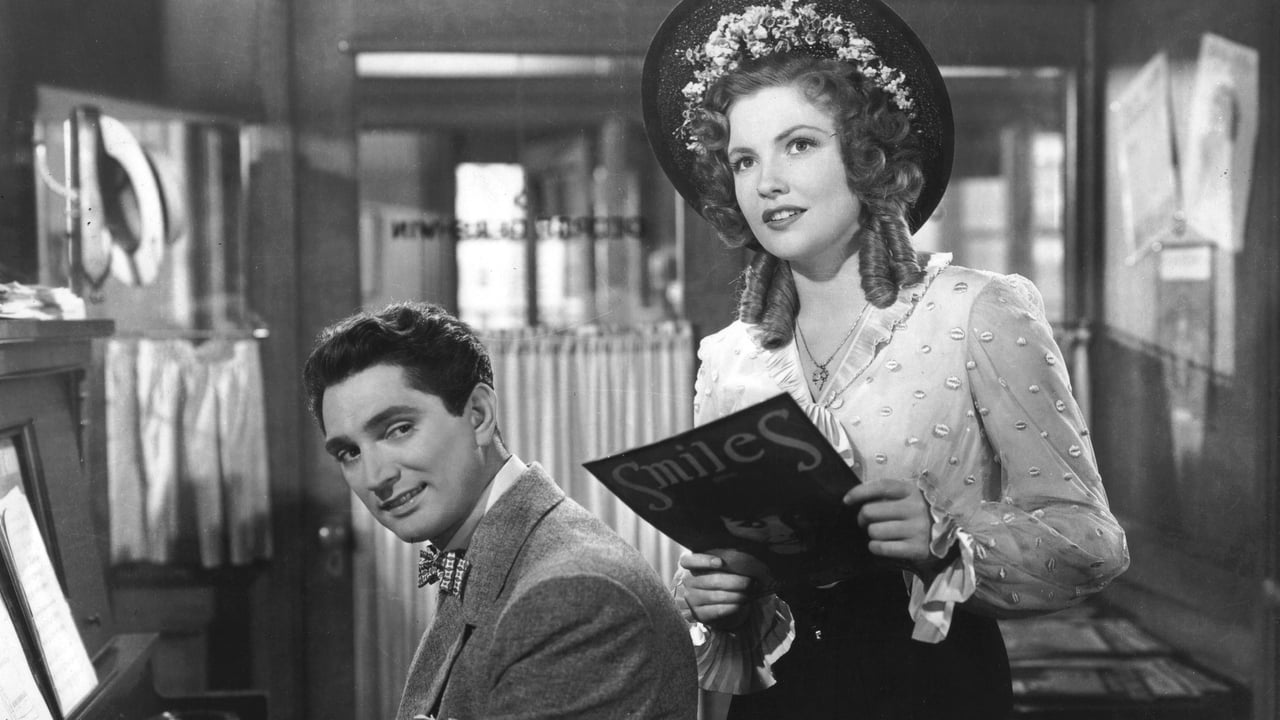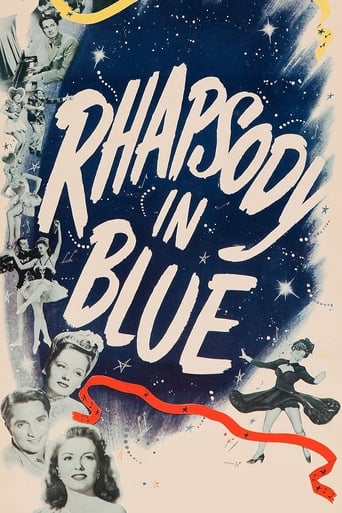

As a biopic, Rhapsody in Blue will disappoint, but musically it is an epic feast that nobody can fail to delight in.Sure, the script is cliché-ridden and sentimental, the film is a bit too long and drags in places and those expecting accuracy or honesty here will be very short-changed, as with most music biopics of this period Rhapsody in Blue is heavily fictionalised. Herbert Rudley also felt undercast as Gershwin's brother Ira.On the other hand, Rhapsody in Blue does look good, with the costumes and sets evoking the period accurately and beautifully and the black and white photography is lovely (though maybe the film may have fared even better in colour). It's well directed, the musical numbers are well and solidly staged and the cast mostly do not disappoint. Robert Alda is a charismatic and likable Gershwin, Alexis Smith is charming and Rosemary DeCamp is compassionate and moving. There are also fabulous supporting turns from a pianistically brilliant and very funny Oscar Levant and a fabulously soulful Al Jolson, his rendition of Swanee being the film's high point. What really makes Rhapsody in Blue worth watching is the absolutely phenomenal music, there's lots of it, which will delight die-hard Gershwin fans, and it is all very well performed (Levant and Jolson in particular standing out).To conclude, a musical feast but could have been better if more attention was put into the biographical elements. 7/10 Bethany Cox
... View MoreIn a working class New York City neighborhood, young Mickey Roth (as Little George Gershwin) and young Darryl Hickman (as Little Ira Gershwin) arrive home and are excited to see a piano being delivered to an apartment in their building. Brother Ira is inexplicably unsure if the piano is for their family, making him very likely the only boy in the Bronx who is unable to pick out his window from the street. Fortunately, the Gershwin brothers are bright in other areas. They quickly grow up to become Robert Alda (as George Gershwin) and Herbert Rudley (as Ira Gershwin). The focus turns almost exclusively on Mr. Alda, who essays a successful career as a pianist and composer. There are hit songs and Broadway shows, but romance is elusive...Like most Hollywood film biographies, "Rhapsody in Blue" takes some facts about a subject's life and fleshes them out with fiction. This story is best during Irving Rapper's well-directed opening and exciting closing sequences; other than that, the movie version of Gershwin's life is a colossal bore. However, the music is excellent. Many of the composer's greatest hits are heard. Legendary entertainer Al Jolson and conductor Paul Whiteman appear, with new versions of their #1 Gershwin hits "Swanee" and the title song. We also see original "Porgy and Bess" stage performer Anne Brown, and many others...Oscar Levant plays himself exceptionally well...This was the debut film for Alda, from success in musical theater; presently, he is more famous as the father of former "M*A*S*H" TV favorite Alan Alda. Robert Alda and Herbert Rudley do slightly resemble George and Ira Gershwin, especially in their scenes together. The filmmakers decided to focus on little brother George and his, at the time, significantly more dramatic life. A better idea might have been to tell both brothers' story as their relationship is the most interesting and engaging in the film. Rudley gets a lot of screen time, but is too often kept on the sidelines. The romances are ordinary and dull.****** Rhapsody in Blue (6/27/45) Irving Rapper ~ Robert Alda, Herbert Rudley, Oscar Levant, Joan Leslie
... View MoreThe film is overly long, due to the length of the musical pieces, and the film is tedious. Does not compare with better biopics, such as Yankee Doodle Dandy and that one with Bob Hope as Eddie Foy. Those had humor. And the Jolson Story and Jolson Sings Again, though also fictitious, are far better.But it is a piece of history and has some real people in it, such as the GREAT AL JOLSON and I don't know who that funny dancing man is in the scene showing the first "Scandals" (maybe it is Shep Houghton, whose IMDb bio lists many appearances where he sadly wasn't even credited. He seems extremely talented and is still alive, apparently!) Hazel Scott, who appears in the film as a black singer in Paris, is not exactly playing herself, per se, since she is too young to have been a Gershwin contemporary, is SOOOOOO excellent, though. I remember her on other TV shows of the 1960s and I guess must have seen her on "Julia" as well. But she was a question on a TV game show I saw--I think it was that show "Cash Cab" so there is a trivia question for you. She ought to have a biopic of her own.I am sick of people insulting Al Jolson! Shut up idiots! He helped make the success of many songwriters and artists, such as Gershwin and Irving Berlin. So it is OK that this song Blue Monday Blues is done with white actors in brown (blackface) makeup? and bad for Jolson to be in "burnt cork"? Get over this PC Police attitude! Jolson ends up losing his place in history because the PC police moan and groan and make themselves into sanctimonious critics of Jolson. THEY have no talent of their own. I am insulted for Jolson that in a recent documentary of Jewish Broadway musicians they cut down Jolson by referring to this scene in this film as a "now shameful" episode of entertainment history, yadda yadda how bad it is to be in blackface, ignoring Irving Berlin's past in minstrel shows. Al Jolson was excellent and not a bigot (see an interview Johnny Carson had with Eubie Blake, defending Jolson). He deserves his place in history.
... View MoreYes, George Gershwin wrote some wonderful music and yes, Warner Bros. does use a lot of his music almost continuously throughout the background--but this has to be a musical bio even more fabricated than NIGHT AND DAY, which purported to be the bio of Cole Porter.All the standard Hollywood clichés are there--the girl friend (JOAN LESLIE--who never really existed) upset because another woman (who else, but ALEXIS SMITH) has stolen her true love's affection. There's even a melodramatic scene where Alexis nobly gives up her love for Gershwin because she knows she's only "the other woman" in his life.Then there's the best friend, played by Oscar LEVANT, who did indeed know George Gershwin well, the devoted brother Ira Gershwin, and the loving parents, including teary-eyed mother ROSEMARY DeCAMP.But while the plot is standard formula bio stuff, the kind that Warner Bros. did throughout the '40s, not much can be said for the performances which are also pretty standard, including ROBERT ALDA as Gershwin. (He's Alan's dad, you know.) Highlights are Gershwin's works performed before concert audiences, including "Rhapsody in Blue" and "Porgy and Bess". There's even a familiar face popping up now and then before stardom came--for example, MARK STEVENS (who is uncredited in the billing) as a singer.Just as NIGHT AND DAY was a complete fabrication, so is RHAPSODY IN BLUE. Music lovers will find plenty to listen to, but don't expect to learn more about Gershwin's real life as a composer.This is one case where the B&W photography looks drab. The studio should have gone all out for color--at least then the film would have been worth watching as well as listening to.
... View More